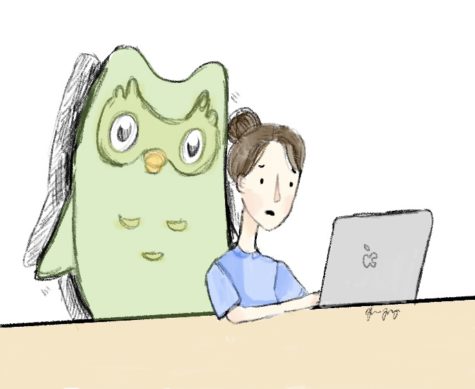Brand Social Media Blurs Company-Consumer Line
April 8, 2022

As a high school student, having and using social media almost feels like a necessity. I need Twitter to keep up with politics and obtain obscure, unnecessary details about celebrity drama, Instagram to feel like I’m still involved with my middle-school friends that I have long since lost contact with, Facebook to see what’s happening with my extended family, and TikTok for my own personal entertainment and to make sure I don’t miss out on any new internet jokes.
Suffice to say, I use A LOT of social media, much to the discontent of adults all around me. While my and other teenagers’ overuse and perhaps even over-dependence on social media platforms is an issue, it’s not the issue I want to discuss today. Instead, I want to talk about the real plague of social media. No, it’s not the drastic negative effects on mental health it can have on younger users. Nor is it the mass and rapid misinformation that can take place on these platforms.
The real issue is the businesses and brands with “casual” social media accounts.
Picture this: You’re scrolling through your For You Page on TikTok and your usual content feed is interrupted by a post from Duolingo, the language learning app. Understandably, you’re a bit confused. You’ve received advertisements on social media before but this video is nothing like anything you’ve seen. It’s a video of someone being paid to dress up as the Duolingo owl in a bathroom making some dumb joke about it smelling bad after a coworker used the toilet. The kicker? The footage is all playing over an audio clip from the cinematic masterpiece that is The Diary of a Wimpy kid movie. You scroll away slightly amused. Someone dressing as the Duolingo owl dancing to popular songs and participating in internet trends can be funny. It’s social media after all.
After a few more minutes of scrolling, you run into another company’s TikTok account. It’s Lionsgate, a movie studio. Their lovely contribution to your social media feed is a very tasteful 10-second video calling Jacob Black from Twilight the “original pick me boy.” This is followed by a respectful video made by Netflix themselves, thirsting over the men in their hit show, Bridgerton.
This is my experience every time I go on TikTok. Sure, it was funny in the beginning. But these types of posts quickly got old. For me, a quick visit to the comment section turned them from a mild annoyance to something a bit more concerning.
Whenever I decide to venture into the scary unknown of a TikTok comment section for one of these accounts, I am greeted with hundreds, if not thousands, of comments to the effect of “OMG we have to stan (insert brand name here) now!” or “I want to be best friends with whoever runs this account.” While this can seem innocent at first, the fact that there are so many of these comments reveals a larger issue with the way that we are receiving these posts from companies.
We start to humanize and personalize businesses and brands that are worth hundreds of millions of dollars.
An inevitable consequence to the humanization of these companies is that users often start to interact with companies and brands as if they are actual people, and we forget what their real intentions are. We forget that all these brands want to do is sell you a product.
And yes, technically, there are actual people running these accounts, but this doesn’t mean that companies are people themselves. Companies aren’t people and they certainly don’t have the same capacity for emotions that their posts would otherwise indicate. In the end, while these accounts may be run by a person, they’re still just deceptive in nature.
Corporate accounts aren’t a way for the company to befriend teens on the internet or become “buddy-buddy” with their consumers. Accounts and posts like these purely exist as a marketing scheme, a way to advertise to children and teens without actually using advertisements.
Luckily for these companies, this tactic works wonderfully for them. I mean, how many times did you hear someone talk about Duolingo outside of a required language class or a feeble attempt to “learn a new language” now that it’s the new year?
Interacting with social media users on such a personal level and creating these shared experiences over internet jokes allow companies to create a foothold in the younger generation. It allows them to stir up interest in the company, earn more support and loyalty, and gain more influence all while avoiding the high costs of advertising.
This type of content often provides a way for companies to form connections with younger audiences all without their audiences even knowing it. The type of content within these social media accounts are a form of “not ads” advertising that to me feels like a way for these companies to sidestep the regulations and rules surrounding advertising and marketing to children.
No matter how much I feel that these practices can exploit younger audiences, it makes perfect sense for companies to create social media accounts and use them to build a platform for themselves. With 21% of consumers being more likely to buy from brands with social media, and with 74% of consumers actually sharing social media content brands, the engagement that having a social media account can produce is unparalleled by any other marketing or advertising tactic. Since social media continues to grow, it’s guaranteed that companies will continue to use it to their advantage. It’s already happening now and it will only continue to get worse.
We need to prepare ourselves for that future. Don’t let funny internet jokes blind you to the type of content you are consuming. While these posts can be amusing, at their very core, they are a marketing tool. They are advertisements whether or not it’s obscured under thirst traps and Tiktok audios.
The negative impact of social media has already revealed just how damaging the relationships we form with each other online can be. We shouldn’t allow companies to be added to that list. Parasocial relationships are bad enough with celebrities. Let’s not create them with the Duolingo owl and other companies.
So, to the Duolingo owl on TikTok, I commend you for your outstanding marketing efforts, especially with your 3.4 million followers and over 65 million likes. Your account is a great marketing tool, just know that I am watching you and I won’t fall for it.


